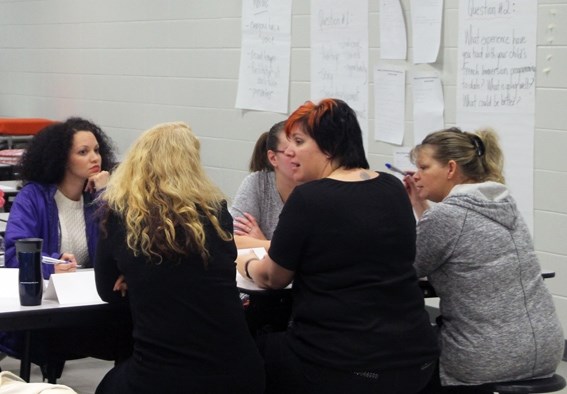Information and security were key points brought up by local parents when discussing the future of French immersion in Cold Lake.
On Jan. 21, 32 parents from Art Smith Aviation Academy, Cold Lake Middle School and North Star Elementary School gathered to participate in Northern Lights School Division's (NLSD) community engagement consultation. Together, they brainstormed about the pros and cons of the French immersion programming, as well as how to make it more viable.
“Fabulous turnout from our perspective, representing about 182 students so very good turnout. You can tell it's very important, near and dear to the parents' heart,” said NLSD superintendent Rick Cusson.
The consultation was a result of decreasing enrolment numbers in the French program. According to Cusson, French immersion students make up approximately 4.8 per cent of their student population for a total enrolment of 182 split between the three schools.
Broken into groups, the parents were asked to answer four questions surrounding the importance of French immersion, what can be done to increase enrolment, and what does the future hold for the program and its location.
“We want to pass on our heritage. I know for us we are a military family, we have moved frequently so it helps to have French in the different locations we go to,” said Sarah Erling, a parent from Art Smith Aviation Academy.
Fellow Art Smith parent Melissa Shea added, “The advantages of having French is that it opens up job opportunities, government and international jobs. Also, one of the families in our group does not speak English so they're gaining English skills as well instead of sending (their kids) to an all French school.”
Groups also brought up the fact that French immersion can offer students an extra challenge, and is an opportunity for kids from Anglophone families the chance to learn a second language.
“In my family, neither my husband or I speak a second language so our kids wouldn't get the opportunity otherwise,” said Tamara Nawrot, whose children attend Cold Lake Middle School.
When asked about their experience with their children's French immersion programming, groups cited uncertainty as being a major negative factor. Declining numbers have caused last minute class cancellations, resulting in families having to switch schools in order to stay in French and not knowing year-to-year where the program will be offered in each grade.
While they like the class sizes, parents are also concerned about the amount of split classes and that the younger students are being stretched too far.
“In certain schools, I feel like French immersion students are secondary to the English students,” said Justine Getz, a mother from North Star Elementary School.
So what is the solution to bring up the enrolment numbers and improve programming? The parent groups offered division officials a number of options. A need for more information and public promotion was a recurring theme. In addition to many not knowing French immersion is offered, groups felt that many Anglophone parents are sometimes afraid of having their children learn in a language they don't understand. As such, tutoring programs, community information sessions, open houses and similar events were popular suggestions.
Dual language Kindergarten classes, French summer camps and activities, consistency in classes and the option to continue French immersion in high school were other solutions that parents offered.
“(The ideas were) very creative; the summer camps, split program Kindergarten between English and French, as well as enhancing a lot of the cultural activities. The French immersion is an important piece – language is one side of it but I know the cultural side is also very important for the French in Canada,” said Cusson.
The final question attendees were asked to consider was what they see for the future of French immersion in Cold Lake and where should the program be located. Strong cases were made by groups both in favour and against having a centralized location for French immersion.
“The military base already holds a diverse and bilingual community from those transferred to Cold Lake. Before and after school care has French-speaking caregivers,” said Shea.
Kris Erling and his group countered, “Cold Lake is a marriage of three different communities. We think you need it in both the north and the south, or else you're going to lose parents. Parents choose schools based on more than just the programs.”
Prior to the consultation with parents, NLSD administration met with staff at the schools. Cusson said their comments echoed those of the parents'.
“(Their thoughts were) very similar to what the parents were saying…we really focused on what to do to enhance the program with them, as well as potential locations,” said Cusson. “There was high support from the staff to centralize into one location so they could build that professional network within one building, but we really wanted the parents to have input into what is going on.”
The NLSD staff will now take the information collected and formulate options to bring before the board of trustees. While everything is on the table right now, including continuing with the status quo, they expect to have a decision in March, in order to give everyone enough time to prepare if there are going to be changes put in place for next school year.



